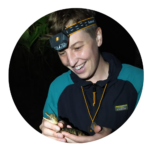Women for Conservation
A discussion with our Global Partner in Colombia
We celebrated World Rainforest Day with our Global Partner, Women for Conservation! We were inspired as the speakers delved into the organization’s community-based programs in conservation training, sustainable livelihoods, and family planning—all aimed at empowering rural women to become guardians of nature and protect critical biodiversity for generations.
For the presentation, we were joined by Isabella Cortes Lara, Vice President & Conservation Director, and Emily Knudson, Director of Outreach & Philanthropy, to learn more about the organization’s work in Colombia. Together, they taught us about the country’s magnificent biodiversity and offered insights into their on-the-ground initiatives. In addition, they shed light on how our partnership supports W4C’s programs that help to deliver accessible reproductive healthcare to rural communities residing in biodiversity hotspots. Their essential programs help young girls complete their education, pursue careers in conservation, and ultimately chase their dreams.
Learn more about our partnership here!
Date: June 28th, 2023
Isabella Cortes Lara
Co-Founder and Director of Conservation
Isabella is a passionate conservationist, committed feminist, performer, and artist of indigenous ancestry born in Popayán, Cauca, Colombia. She is the Director of Conservation for Women for Conservation, a nonprofit that empowers women in rural communities around Key Biodiversity Areas. As an artist and musician, she uses her creative forces to advocate for endangered species protection, the rights of the LGBTQ community, rights of indigenous communities, reproductive rights, and the conservation of ecosystems.
She has a BS in Wildlife and Fisheries Management and Conservation Ecology from West Virginia University and is currently pursuing an MS in Natural Resource Conservation at the University of Kent in England. Isabella also has the great honor of being the namesake for a species of hummingbird, Eriocnemis isabellae listed on the IUCN Red List as Critically Endangered.
Emily Knudson
Director of Outreach and Philanthropy
Emily (she/they, ella/elle) is an activist and academic with over 10 years of experience working in intersectional environmental justice advocacy. Emily holds BAs in Environmental Studies & Spanish as well as a Master’s degree in International Women’s and Gender Studies from the University of Granada in Spain.
Before arriving at W4C, Emily worked as an adjunct professor of Environmental Justice, a founding member of Augsburg University’s Mississippi River Semester Program, a Fulbright Scholar in Brazil, and a Communications Specialist for NYC’s Parks. They dream of and work towards a better and more equitable world – one where all people have access to basic reproductive healthcare, where women and indigenous people are empowered to be guardians of nature, and where wildlife and rainforests are set free to thrive.
Q&A
Questions from audience, with responses from Women for Conservation
Can ecotourism to some of your sites exist—and if so which ones? Do the money tourists bring help your organization’s programs?
While eco-tourism can often be extractive and even displace people from their ancestral homelands, ethical eco-tourism can also be a tool to uplift communities and encourage conservation. Women for Conservation’s environmental education, conservation training, and sustainable livelihood programs in the Sierra Nevada de Santa Marta’s El Dorado Reserve are a great example of how ecotourism can empower local communities while also benefiting endangered species conservation.
Women for Conservation’s programs are specifically designed to give local Colombians opportunities to benefit from the ecotourism economy while protecting rainforests – through training them for eco-tourism jobs, helping them establish eco-businesses, and providing resources for them to remain stewards of their traditional land. By training women and school children to identify native wildlife, we prepare them for careers as nature guides and help them use their local environmental knowledge to become economically empowered. W4C’s sustainable livelihood program trains and provides official certifications for women seeking to establish eco-tourism microbusiness so they can benefit from the tourism economy. We also facilitate the fair trade-sale of sustainably produced artisanal goods and jewelry in our reserve eco-stores, bringing supplemental income into local communities. Additionally, our accessible family planning work in the region has empowered hundreds of girls to finish high school, pursue conservation jobs, and follow their dreams. Finally, by facilitating opportunities for locals to economically benefit from eco-tourism, we empower them to remain owners of their land, rather than being pressured to sell to extractive speculators and international developers. All of these programs benefit local communities while also encouraging the conservation and protection of endangered wildlife and rainforests.
How does Women for Conservation (W4C) address the lack of accessible family planning resources in rural communities?
To address the lack of accessible family planning resources in rural communities, Women for Conservation (W4C) implements mobile family planning clinics that travel to remote villages. These clinics provide crucial services, including accessible sex education, cancer screenings, and contraceptive implants. W4C partners with Profamilia, a local health organization, which provides medical professionals while government sponsored healthcare to covers the cost of procedures for insured Colombians. W4C takes responsibility for organizing logistics, travel arrangements, local medical facilities (often a local woman’s home), and healthcare costs for the uninsured.
By facilitating transportation for Profamilia nurses, arranging clinics, and collaborating with the women in these communities, W4C ensures that Profamilia can reach women in rural areas who would otherwise struggle to access reproductive healthcare. Additionally, W4C conducts screenings for breast cancer, which is the leading cause of cancer-related deaths among women in Colombia. These screenings are often the first cancer screenings these women have ever received, highlighting the critical role W4C plays in early detection and prevention efforts.
Has anything changed since Roe v. Wade was overturned in the United States, e.g. funding from the US?
While the overturning of Roe v. Wade has influenced a surge in funding for US reproductive justice organizations, W4C and other international family planning organizations have not received a significant increase in international support.
W4C supports women’s reproductive autonomy, although we focus on providing contraceptive access, as this is the most effective and impactful avenue to empowering women and supporting reproductive autonomy in rural communities with virtually no access to family planning resources. Our family planning programs provide sexual education, family planning resources, cancer screenings/ education, and contraceptive procedures (Tubal ligations, contraceptive implants, and vasectomies).
Our work has provided reproductive choice to over 1,200 rural Colombian families since 2019, and we have hundreds of more families on our ever-growing waiting lists. We encourage women’s reproductive autonomy supporters to maximize your impact by supporting our programs, as our current 2X donation match allows us to provide contraceptive healthcare that can profoundly change a girls life for just $25, allowing her to finish school, pursue conservation careers, and follow her dreams.
Do you receive support from the Colombian government? How do they view your work?
The Colombian Government does not support our work financially, but they do contribute to our programs by facilitating gender empowerment conferences, while the governmental environmental sector has recently started incorporating our project sites into the official government system of protected areas.
While Colombia’s government healthcare system covers medical needs including contraceptive procedures, many of the most vulnerable families still cannot access this healthcare. Women for Conservation helps vulnerable women overcome additional barriers preventing them from accessing this basic healthcare.
W4C completely covers the cost of reproductive healthcare for Venezuelan immigrants, who are excluded from Colombia’s healthcare system and are often especially precarious due to their displacement and refugee status. We also have helped hundreds of Colombian families register for government healthcare, as internal displacement, illiteracy, and complicated paperwork prevent many people from registering to this government service they are entitled to as Colombian citizens. Most importantly, we facilitate mobile clinics which travel to rural communities, relieving the need for women to make long and expensive journeys to access urban healthcare clinics. Without us providing transportation for the profamilia nurses, arranging a clinic for the procedures to be done, and organizing with the women in the community, Profamilia would not have the resources to reach women in these rural communities. Through this work we have facilitated access to contraceptive healthcare access for over 1,200 families since 2019.
What are the trends in birth rates in Colombia? Are we seeing the declines that come from educating women?
Birth rates in Colombia have witnessed significant declines in recent decades, particularly in urban centers, where education and access to family planning resources are more readily available. However, like many countries, Colombia still has a high teenage pregnancy rate due to a lack of comprehensive sex education in schools, socioeconomic barriers preventing access to reproductive health, and a lack of systemic support for victims and survivors of sexual violence and abuse. According to data from the United Nations Population Fund (UNFPA), in 2020, the teenage pregnancy rate in Colombia was estimated to be around 58 births per 1,000 girls aged 15-19. This rate is significant in comparison to the national US teenage pregnancy rate in 2020 which was 15.4 births per 1,000 girls ages 15-19. Women and teenage girls face many significant barriers to receiving birth control such as living in remote villages and towns with little access to health clinics and high costs of transportation.
Can you describe the project Women for Conservation has done with the giant river otters?
Women for Conservation has developed conservation education and species monitoring programs with women and children in the Amazon Rainforest buffering our El Jaguar Reserve. We have trained local residents to assist in monitoring local endangered species, including the Jaguar (Near-threatened), Churuco Monkey (Vulnerable), Plains Night Monkey (Vulnerable), Harpy Eagle (Near threatened), Amazon Pink Dolphin (Endangered), and Giant River Otter (Endangered). Community members record each sighting, documenting the location, abundance and behavior of the animals. Knowledge of the status of wild populations is vital for directing conservation strategies of these species.
Women for Conservation also protects these endangered species by training and employing women forest rangers, such as our internationally honored Ranger Ninfa Carianil Damaso. Additionally, we are in the process of developing our Amazon Rainforest Research Station along the Guaviare River – which will promote scientific research as well as data collection jobs for local Colombian women in our conservation training programs. Finally, our family planning mobile clinics for women in this region have been wildly popular, and over 200 girls and women have chosen to get contraceptive implants, which allow them to finish high school, attend our conservation trainings, and pursue environmental job opportunities.
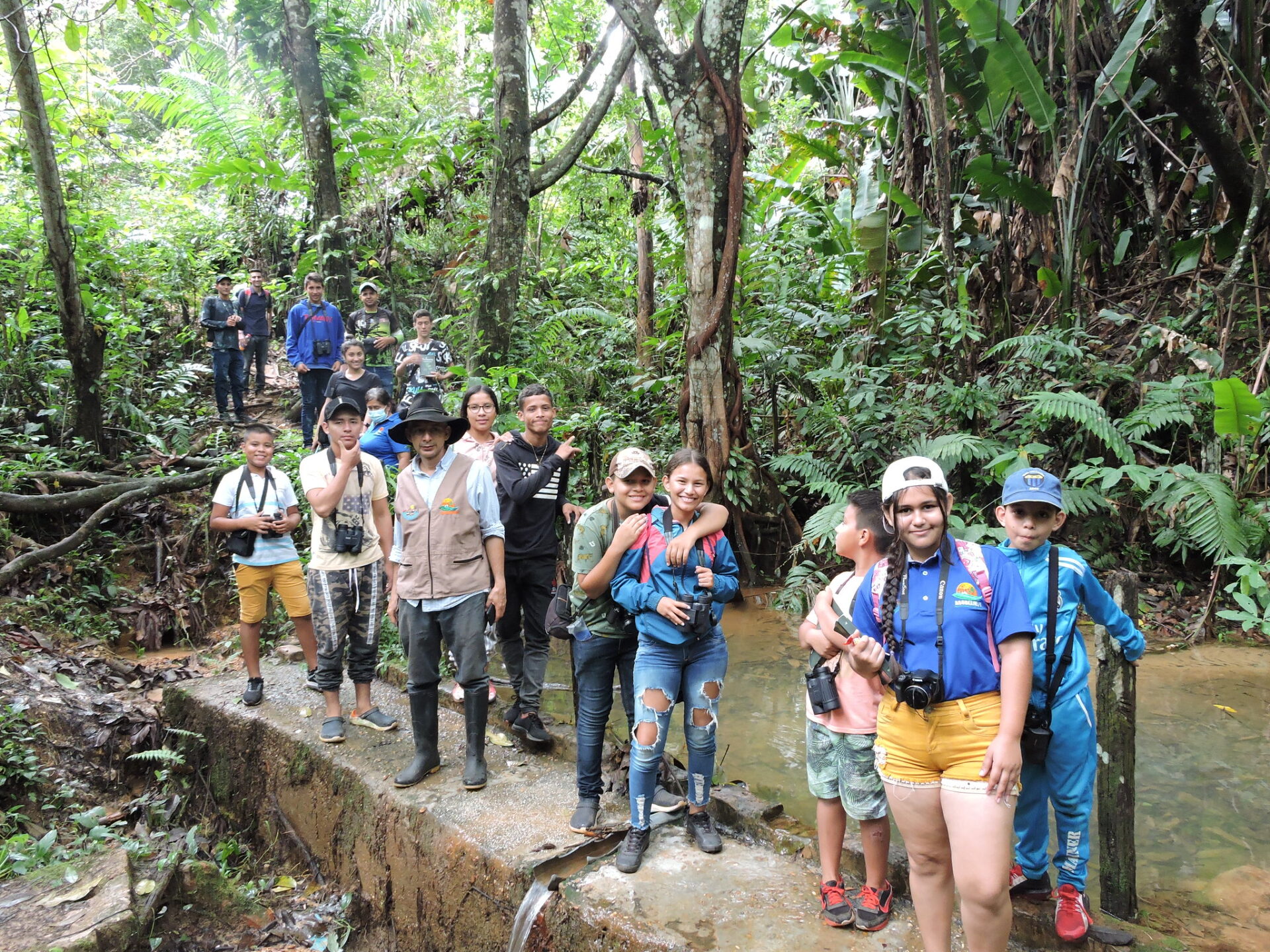 Youth environmental education field trip at El Jaguar Reserve
Youth environmental education field trip at El Jaguar Reserve 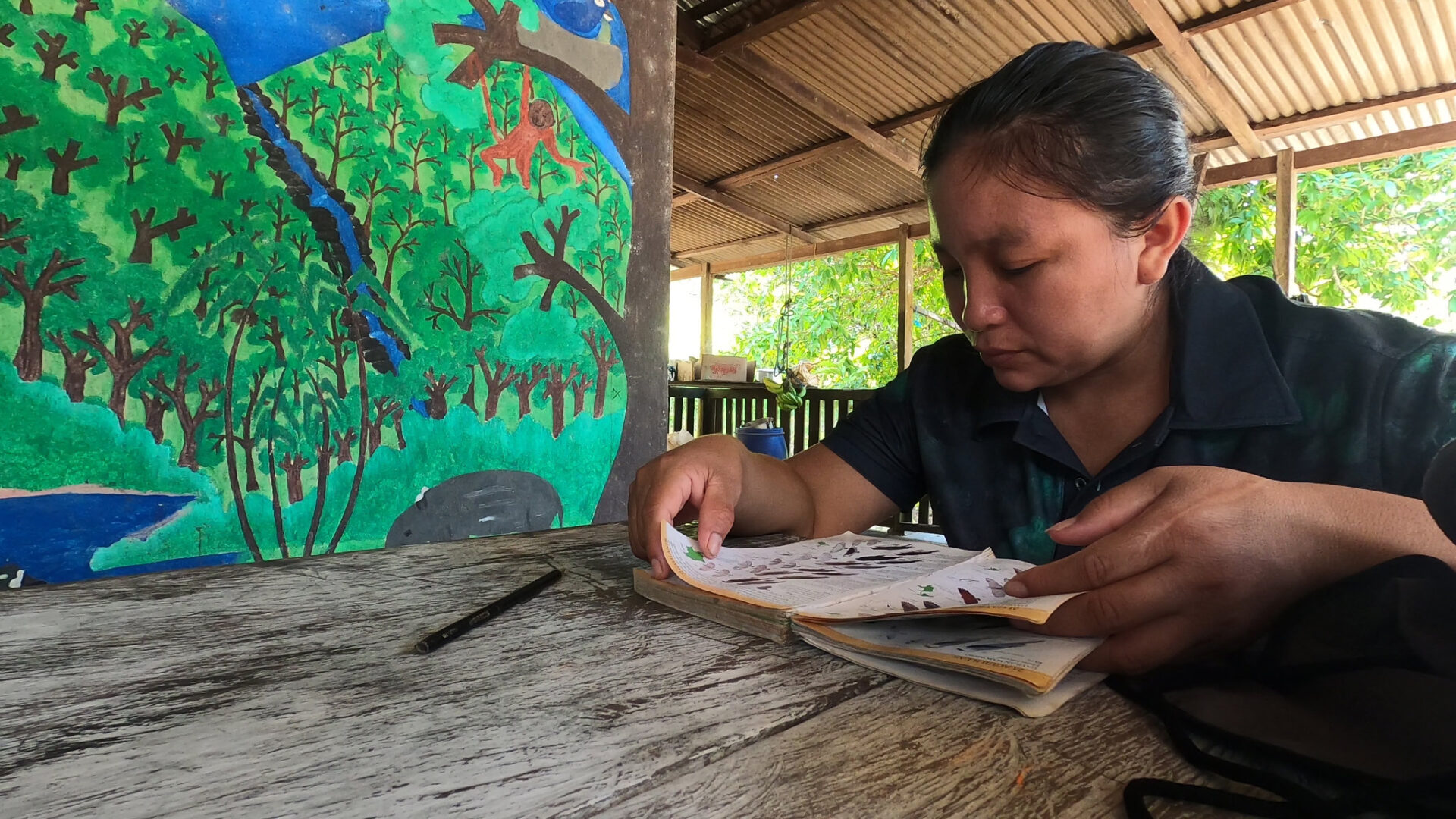 Forest Guard keeping up on their bird identification skills
Forest Guard keeping up on their bird identification skills 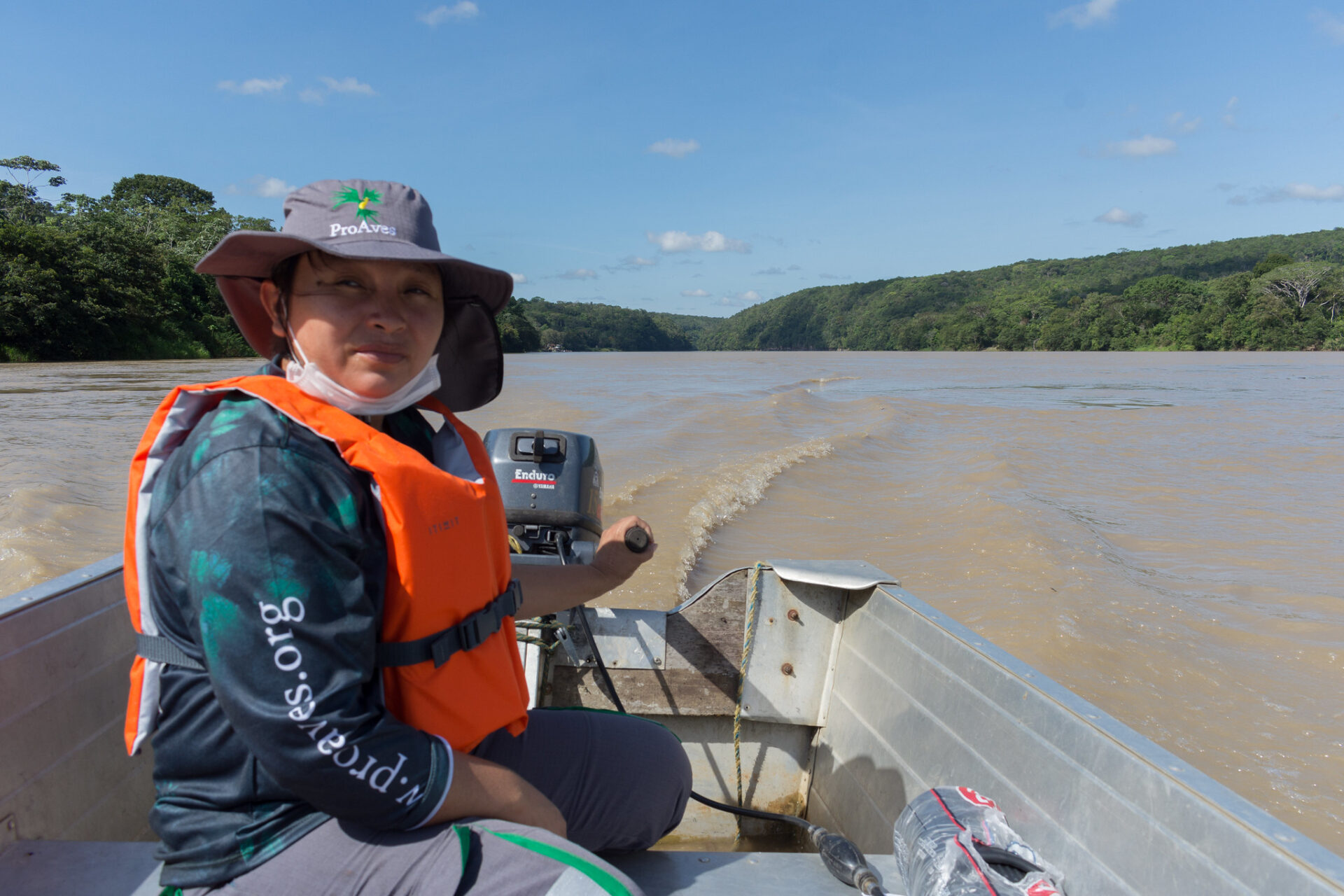 Ranger Ninfa Patrolling the River
Ranger Ninfa Patrolling the River 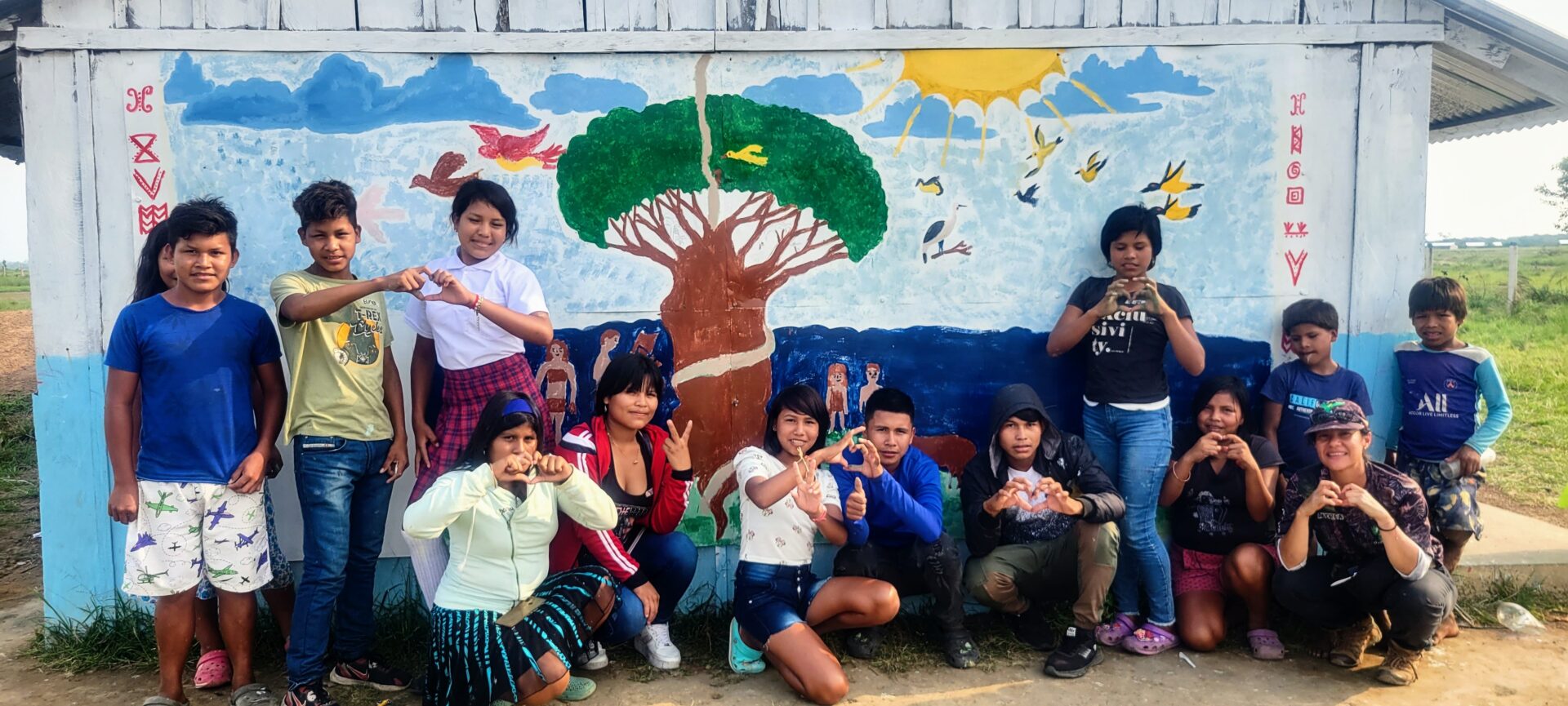 Young students posting with a school mural honoring Colombia's biodiversity
Young students posting with a school mural honoring Colombia's biodiversity 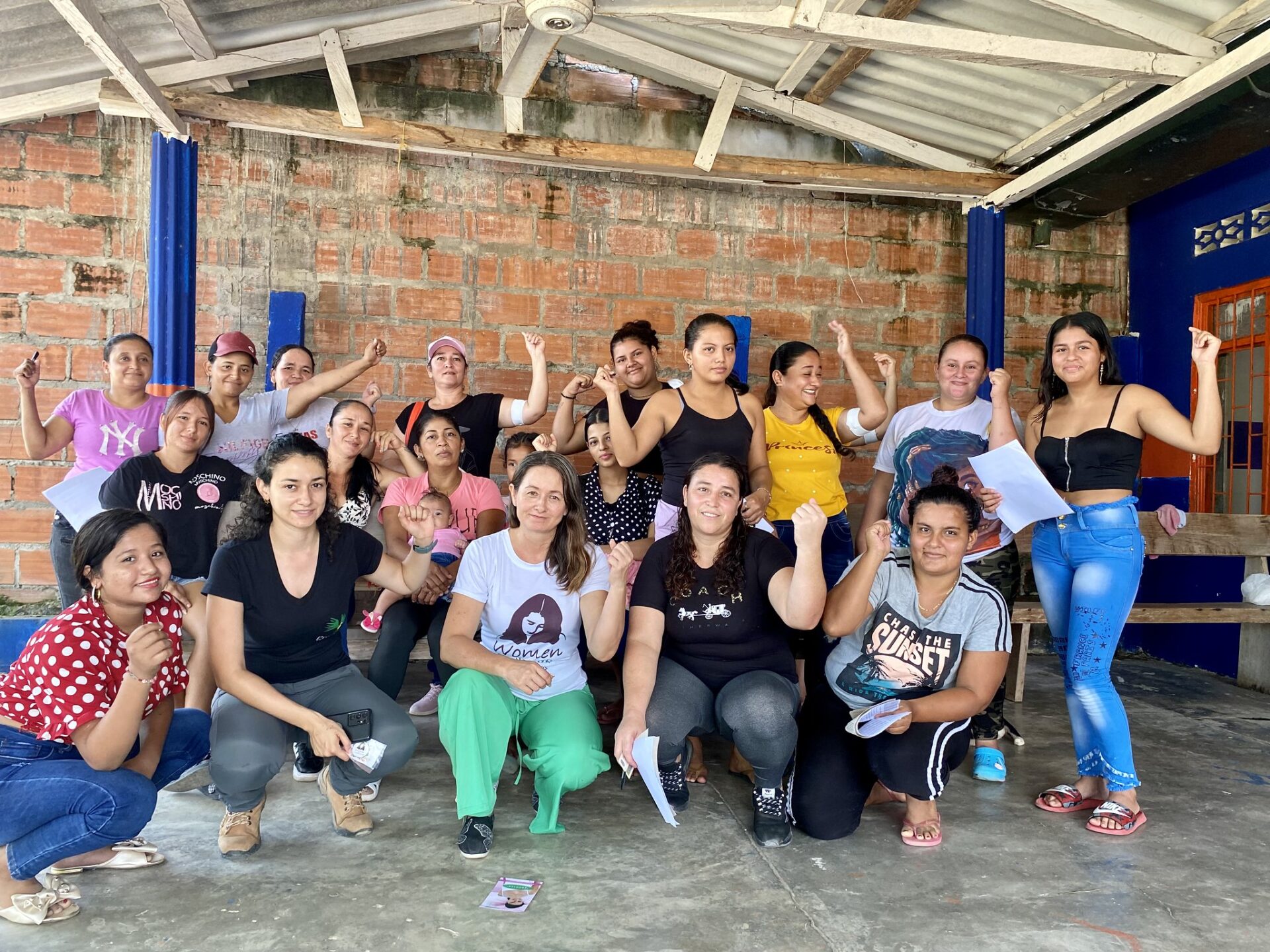 Empowered women in Boyacá making decisions about their reproductive healthcare
Empowered women in Boyacá making decisions about their reproductive healthcare 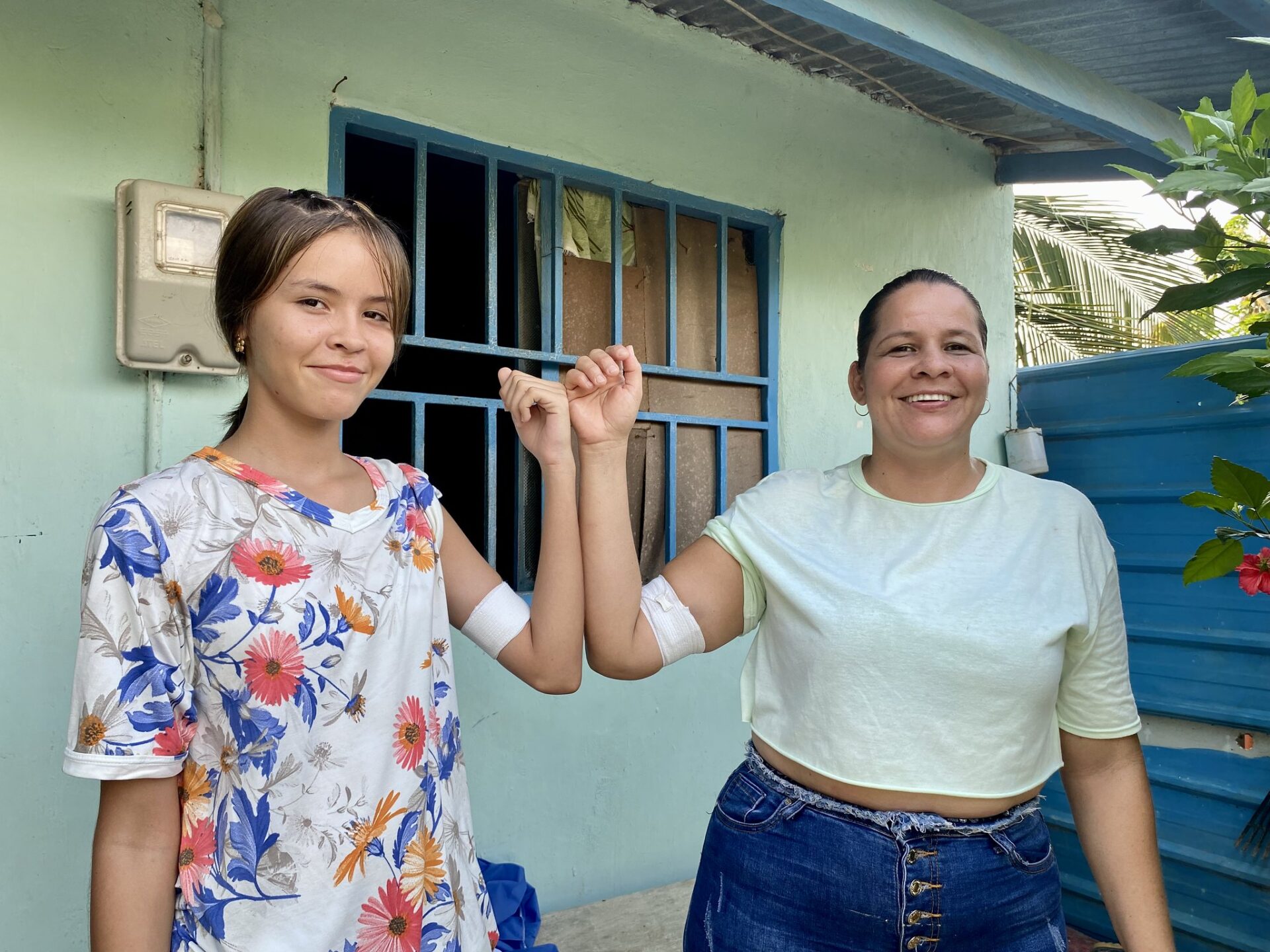 Mother and daughter posing after accessing family planning services
Mother and daughter posing after accessing family planning services 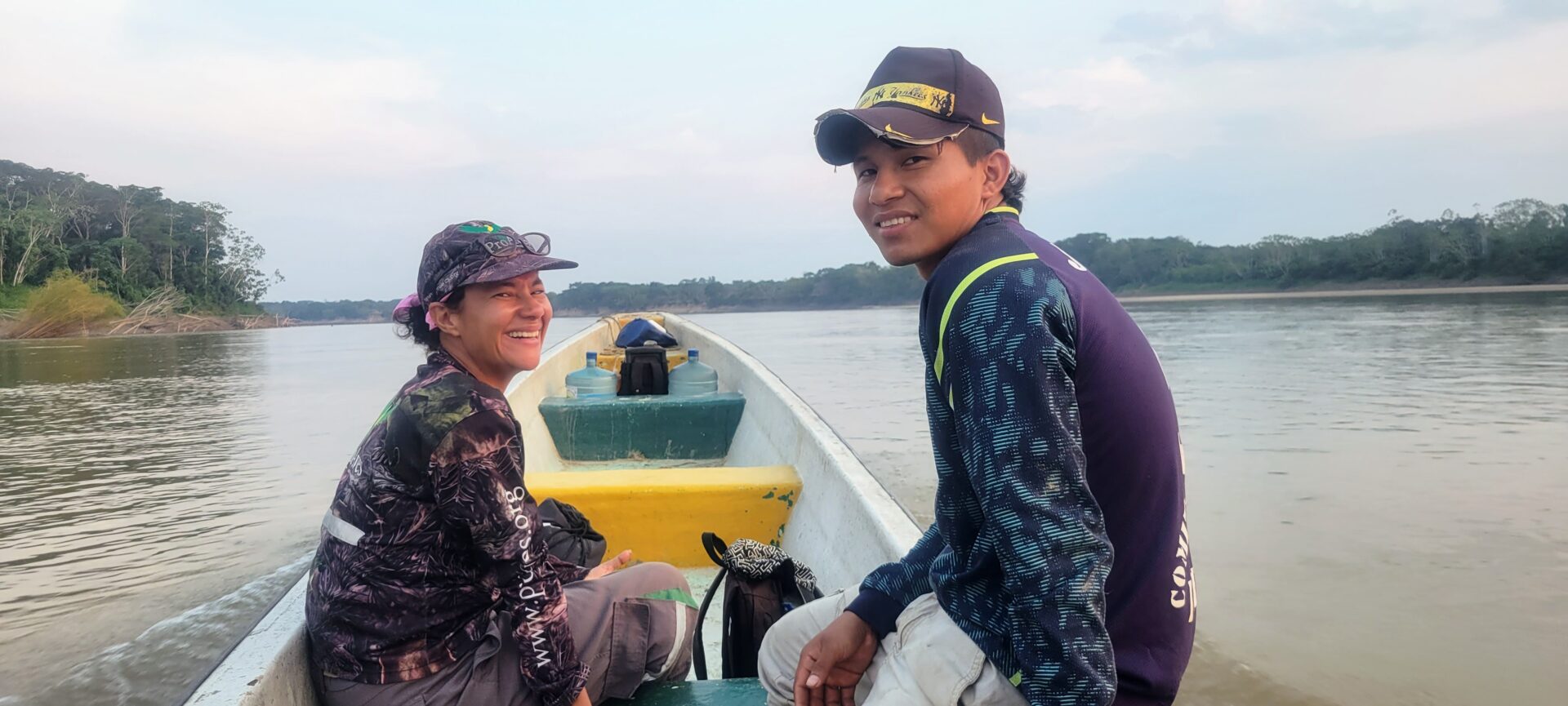 Amazonia Region Reserve Director Andrea Caceres out on the water
Amazonia Region Reserve Director Andrea Caceres out on the water 

